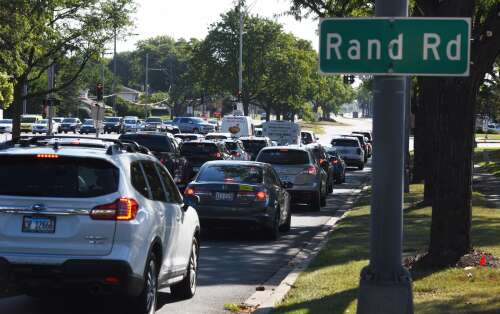It’s 2036, and you’re about to make a huge mistake — turning south into the northbound lanes of a busy route.
Suddenly, your car gives an alert, preventing a possibly fatal error.
Or, the early morning fog means you and the cyclist ahead can’t see each other. But your V2X system is ready and so is the bike owner’s, as both sound warnings in time to avert a collision.
Those scenarios could become common with vehicle-to-everything (V2X) communication, said federal officials who are rolling out a comprehensive plan to deploy the technology nationwide.
Using wireless messages, V2X enables vehicles to communicate with each other, as well as roadside infrastructure such as traffic signals. It also allows for the detection of vulnerable road users such as pedestrians, cyclists and road crews.
Information gathered includes the locations of cars and people, traffic conditions such as red lights, construction, lane closures or slick pavements.
“This plan is a vital first step toward realizing the full lifesaving potential of this technology — technology that could prevent up to 615,000 crashes (annually),” National Transportation Safety Board Chair Jennifer Homendy said at an Aug. 16 briefing.
Deploying V2X has languished for years on the U.S. Department of Transportation’s bucket list.
V2X “is game-changing, but for too long it’s been hampered by regulatory uncertainty,” said John Bozzella, CEO of the Alliance for Automotive Innovation.
“Part of the problem was there’s a lot of complications that haven’t been worked out,” auto expert Tom Appel of Palatine noted Wednesday. “There’s an obvious benefit — if vehicles are aware of other vehicles or aware of infrastructure — they can respond.”
But installing the system “is going to be expensive,” explained Appel, Consumer Guide Automotive publisher.
And he’s concerned the government hasn’t dedicated funding to install V2X infrastructure on everything from stop lights to intersections to speed signs. “Municipalities are certainly not going to do this. I’m trying to understand like how much it would cost for Chicago to install this kind of communications technology at every intersection and every single crosswalk, etc.,” Appel said.
“The upside is huge but I’m very worried nothing is going to come of this.”
IDOT has applied for funding related to connected vehicles and is finalizing a contract to develop a framework to transfer work zone data to vehicles, a spokeswoman said.
What else has hampered the project? There are cybersecurity concerns to resolve and the Federal Communications Commission has to decide on allowing widespread V2X use on a dedicated spectrum.
The plan laid out by the U.S. Department of Transportation sets benchmarks including installing V2X technology on 20% of the National Highway System by 2028 and 50% by 2031, with full connectivity by 2036.
“I’m more optimistic than I’ve been in a long time about our collective ability to realize the lifesaving potential for V2X,” Bozzella said.
DOT experts cited a Tampa Hillsborough Expressway Authority test of connected vehicles that used about 1,100 drivers. The Florida agency reported that 21 potential pedestrian crashes were prevented, 14 wrong-way drivers were alerted, 17 potential vehicle collisions were deterred and more than 20,000 safety warnings went out between 2021 and 2022.
“This is proven technology that works,” Federal Highway Administrator Shailen Bhatt said.
You should know
Want one of those spanking-new Illinois tollway stickers replacing hard-case transponders? You can pick one up at an I-PASS On Demand Event from noon to 6 p.m. Monday at Algonquin village hall. It’s organized by state Sens. Don DeWitte and Dan McConchie.
One more thing
In three years, IDOT is expected to resume train service to Rockford in collaboration with Metra. The new route will offer stops in Elgin, Huntley and Belvidere. You can learn more about the project at suburban forums Sept. 17, at The Centre of Elgin, 100 Symphony Way, and Sept. 18, at the Huntley Park District, 12015 Mill St. Both run from 4 to 7 p.m. For more info, go to chicagotorockfordrail.org.
Upcoming
Riders underwhelmed by local bus or train service can speak out at a Tuesday forum on “the lack of public transportation in the Northwest Suburbs,” organized by Cook County Commissioner Maggie Trevor. The town hall runs from 5:30 to 7:30 p.m. at Endeavor Health Northwest Community Hospital, 800 W. Central Road, Arlington Heights.
The post Talking cars might prevent up to 615,000 crashes a year, but skepticism persists appeared first on Patabook News .

